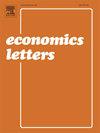关于再分配的聚合偏好的说明
IF 1.8
4区 经济学
Q2 ECONOMICS
引用次数: 0
摘要
标准异质主体宏观经济模型的政策预测常常与观察到的政策不一致。我们使用综合社会调查来调查个人对税收和再分配偏好的驱动因素。我们发现,这些偏好与政治身份的关系比与经济地位的关系更强。我们讨论了具有内生政策决定的定量宏观经济模型的含义。本文章由计算机程序翻译,如有差异,请以英文原文为准。
A note on aggregating preferences for redistribution
The policy predictions of standard heterogeneous agent macroeconomic models are often at odds with observed policies. We use the General Social Survey to investigate the drivers of individuals’ preferences over taxes and redistribution. We find that these preferences are more strongly associated with political identity than with economic status. We discuss the implications for quantitative macroeconomic models with endogenous policy determination.
求助全文
通过发布文献求助,成功后即可免费获取论文全文。
去求助
来源期刊

Economics Letters
ECONOMICS-
CiteScore
3.20
自引率
5.00%
发文量
348
审稿时长
30 days
期刊介绍:
Many economists today are concerned by the proliferation of journals and the concomitant labyrinth of research to be conquered in order to reach the specific information they require. To combat this tendency, Economics Letters has been conceived and designed outside the realm of the traditional economics journal. As a Letters Journal, it consists of concise communications (letters) that provide a means of rapid and efficient dissemination of new results, models and methods in all fields of economic research.
 求助内容:
求助内容: 应助结果提醒方式:
应助结果提醒方式:


